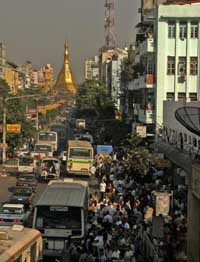EU says Myanmar slowing down ASEAN, welcomes bloc's efforts to impose sanctions
European Union officials criticized Myanmar's slow progress toward democracy and welcomed on Tuesday efforts by Southeast Asia's main bloc to create rules that would allow sanctions against errant members.

The officials also deplored a spate of unsolved killings of activists and journalists in the Philippines.
"As far as Burma, or Myanmar, is concerned, we all see clearly that it's not very helpful what the government there is doing as far as ASEAN is concerned," said Ambassador Axel Raimund Weishaupt of Germany, which currently holds the EU presidency.
Myanmar has been internationally criticized because of its failure to democratize and release political prisoners.
Weishsaupt said the attitude of Myanmar's junta was slowing down the process of integrating the 10-member Association of Southeast Asian Nations.
He described Yangon's recent release of some political prisoners as "a small gesture," and urged Myanmar's fellow members in ASEAN to be firmer with the junta.
"I can only hope that internally the discussions go on and the attitude of all the other nine states (in ASEAN) will be firmer," he told a news conference.
Ambassador Alistair MacDonald, the head of the European Commission delegation in the Philippines, welcomed a decision by ASEAN leaders at a summit in the Philippines earlier this month to start the process of drafting the bloc's charter that would adhere to the principles of democracy and human rights.
Government-appointed advisers have said that members that breach ASEAN's principles should have their rights and privileges suspended or even be expelled in extreme cases.
"For ASEAN to follow on that path would give ASEAN a stronger capability in addressing the issues of democracy, governance and integration," MacDonald said.
Weishaupt expressed hope ASEAN could establish in the future a body similar to the EU's Court of Human Rights, where citizens can seek redress.
Weishaupt also called for an end to a string of killings of left-wing activists and journalists in the Philippines, the current chairman of ASEAN. He said EU officials have relayed their concern to Philippine officials, reports AP.
"All EU member states ... and the European Union itself deplores what we read in the newspapers," he said. "We really hope that measures are taken to bring it to an end."
Military and police officials have denied activists' allegations the killings were done by security forces, challenging accusers to produce evidence and file charges in court.
Pro-democracy leader Aung San Suu Kyi has been in prison or under house arrest for 11 of the last 17 years. Myanmar's military junta regularly calls her a threat to national unity and says she and her party are trying to undermine the government by collaborating with foreign powers.
Subscribe to Pravda.Ru Telegram channel, Facebook, RSS!




